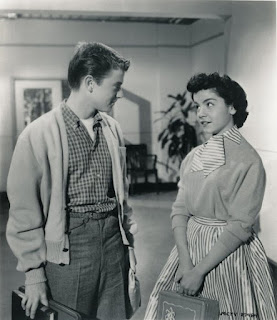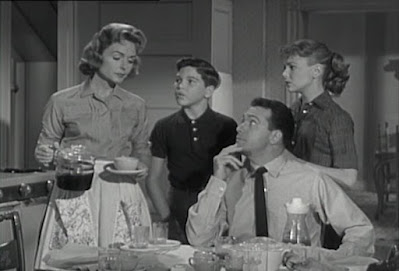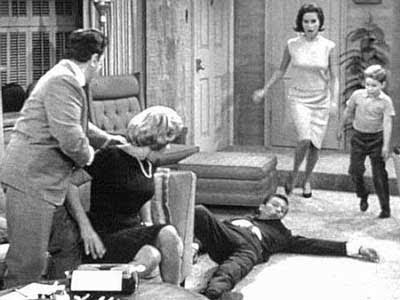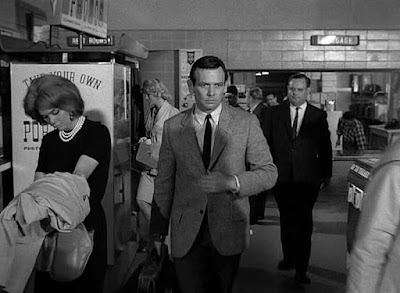In a recent blog about the passing of Tim Considine, I wrote that he once represented an ideal – in this case, the American teenager of the late 1950s. In that decade, as well as into the 1960s and even ‘70s, television provided many such ideals within its dramas, comedies and westerns.
Was that a positive choice for a mass medium that reached millions of people every night? At one time that would not have even been a question. But as with so many beliefs that were once held universally, this one has been subjected to harsh reassessment.
The original school of thought was that ideals provided a paradigm that is beneficial, because they show us what is possible when a person cultivates healthy values, positive character traits, self-discipline and good manners.
No one does the right thing all the time – Jim Anderson occasionally slipped as a dad on Father Knows Best, and even the practically perfect Donna Stone miscalculated in the occasional parental edict on The Donna Reed Show. Rob Petrie was a klutz; Marcia Brady’s ego could inflate a little too easily.
But these are hardly the first traits that come to mind when describing these characters. Instead we recall their kindness, their intelligence, their achievements, and the positive standing they enjoyed in their communities. If a viewer decided to co-opt these qualities, there is no reason not to believe they might one day achieve the same status.
But over the past ten years or so a new view has emerged, one that claims ideals are dangerous because they present an unrealistic depiction of a person, one that will stimulate low self-image and self-worth when one fails to live up to the example being set.
Such characters from the Comfort TV era are further marginalized because most were white, and apparently it is no longer possible for someone from a different race or ethnicity to emulate their positive example. Thankfully that divisive way of thinking was not prominent in the decades when Mr. Rogers was uplifting all children by telling them they were unique and special and could be liked just for who they are.
Do ideals inspire or frustrate? That’s the debate, and it won’t be settled here. But I don’t think it’s inaccurate to say that this type of character is no longer prominent on television. What makes most characters interesting to a modern audience is their faults, not their virtues: social awkwardness, hair-trigger hostility, disrespect for authority, self-absorption.
Well, sure, I imagine someone in his or her 20s thinking – ideal characters are boring. But that was never a problem with the TV shows from an earlier era. Challenges in storylines emerged not from a character’s defects, but the trials brought into his or her life by a less virtuous world.
There is no better example of this than The Fugitive. Dr. Richard Kimble, on the run after being falsely accused of murder, tries to stay one step ahead of the law while he tracks down the real killer. He is smart, resourceful, and he repeatedly risks his life out of compassion for others, including complete strangers. But no one would ever claim this was a dull show because of its honorable protagonist.
Many of the episodes of this series (and so many others from the Comfort TV era) could be classified as morality tales, a literary form that has been around since, well, literature. They are comprised of three elements: conflict, decision, and lesson, and if you apply those elements to almost every episode of The Fugitive or just about any series from that time, you’d be amazed at how often they track in the script. The lessons conveyed in their final scenes gave viewers something to take away from the story that could be helpful in their own day-to-day decision-making.
I don’t claim to be an authority on which series from network, cable and streaming services are currently most popular. But from those I’ve seen, usually by accident, I haven’t noticed any characters that conform to the designation of an ideal. And those that try their best, like the costumed superheroes who fight for truth and justice, are punished severely and repeatedly for their altruism.
What message is being sent by such shows? If you try to do the right thing, prepare to suffer? Well, there’s precedent for that as well going back to the New Testament; but unlike those narratives the heroes in today’s passion plays don’t always get the redemption that follows the torment.
Television used to promote the idea that success and achievement came to those who did the right things.
It did this in part through ideals, which, even when they were unrealistic, served a purpose by showing us how to act and relate to others to have a contented life. I don’t see much evidence of this anymore – perhaps that’s another reason why contentment has been in shorter supply.








I commented on this years ago as I noticed it happening. These ideals weren't necessarily meant to be achievable, they were ideals (as you said) that we should strive and reach for. At some point, instead of reaching for ideals, we decided to drag them down to meet us half way.
ReplyDeleteVery well put. I agree. And once we start lowering our expectations of how we act and treat each other, how low will they go?
DeleteI very much liked this (and I hope you see this comment as mine never seem to make it online). And I especially like what you wrote regarding superheroes for example, being hung out to dry for their good deeds. And perhaps it's the norm now, but last week I finished watching the first season of Julia on HBO Max (about the early days of Julia Child) and it's almost like they said "what if we created a world here where everyone genuinely liked one another"? It's been a dear , gentle watch and takes me back to the earlier days of TV.
ReplyDelete